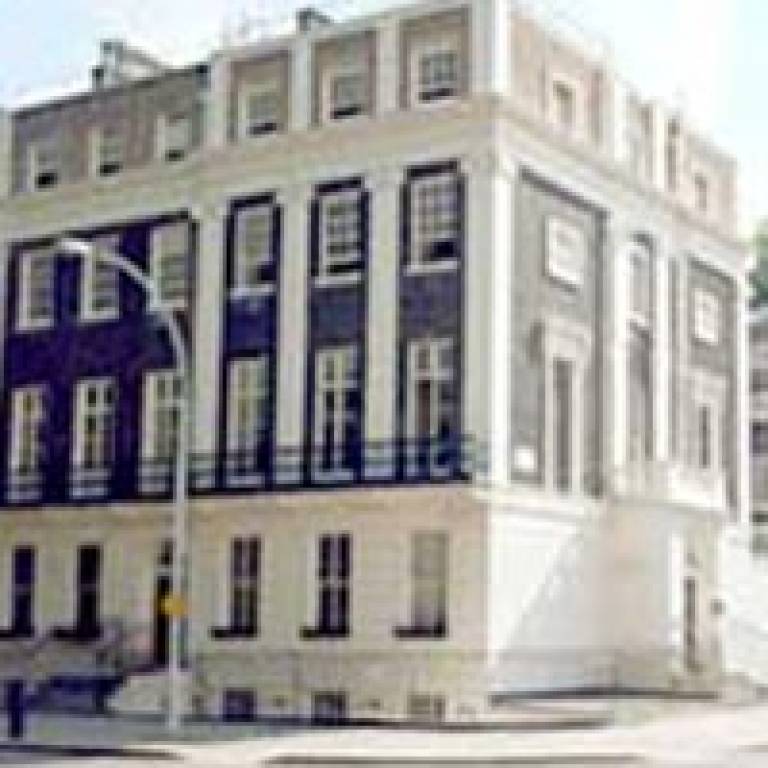School of Public Policy celebrates tenth anniversary
30 May 2007
On 31 May, the UCL School of Public Policy (SPP) celebrates its tenth anniversary, with a presentation by Sir Bernard Crick, a roundtable discussion on global citizenship, and a lecture by Professor Richard Bellamy on why judicial review and constitutions are illegitimate and do not work.

Founded in 1997, the Department of Political Science/School of Public Policy is Britain's only department focused on graduate teaching and research. It combines world-class scholarship to address policy problems with the training of the new generation of democratic politicians and public servants. International in outlook and ambition, its staff and students come from across the globe. With 200 Masters students and 20 doctoral students, it is now one of the largest graduate schools in the discipline, and its alumni play key roles in national and international government, NGOs and business.
Teaching and research at the school are concentrated in six areas:
Human Rights
The Human Rights programme was established in 2003 and has proved hugely attractive to high-calibre students from all over the world. For 40 full-time Masters places this year, the course received over 300 applications. The small but growing alumni network provides a good contact base for students and staff on the course. Among the PhD student is looking at toleration of religious minorities in Europe - an issue with obvious clear resonance globally.
International Public Policy
The International Public Policy course at the SPP provides a unique approach, which distinguishes it from any other similar courses the UK: it combines the study of international relations with a public policy focus on governance within the state. A compulsory element of the course is to study research methods - providing a crucial vocational training for people wishing to enter the field. Research dissertations also focus on current issues and have resulted in recruitment of students into organisations active in the fields they have researched. Students within this study area have founded a journal, the 'International Public Policy Review', which is the only journal to bring together international relations with public policy.
Legal/Political Theory
Legal and political theory encompasses the ethical evaluation of public policy and looks at the behaviour of politicians and bureaucrats. Research work carried out under this banner within the SPP includes an exploration of the issues surrounding the headscarf debate in France, offering a comparison with racial and religious integration in the UK. The unit also has projects ongoing looking at the EU accountability and consultation, and the question of civic education within the European Union.
Public Policy/European Public Policy
This Masters programme attracts high quality students who fall into two broad categories. Some are mid-career, often holding or looking to move to high-ranking positions, while others are young graduates at a stage prior to taking on decision-making roles, such as policy advisors. Key research areas include business/government relations, regulatory reform, and policy design and implementation. Implementation at the EU level is of particular relevance at the moment as companies lobbying in Brussels are keen to be seen as 'good Europeans'. Differences in national legal systems, however, can mean that European countries' legal systems respond to them in different ways.
Comparative Politics
This programme, though very new, also boasts a mix of theory and practice, which has made it successful and popular. Comparative politics is the study of domestic political institutions in different countries. A new Masters in Democracy and Democratisation focuses on the design of electoral systems and what those designs mean for the people living under them. One area of research currently being undertaken looks at the problems entailed by democracy as a majoritarian system, which means that the interests of minority ethic groups are sometimes overlooked by politicians. Students on this Masters programme must take a course in quantitative and qualitative analysis, which has been seen to provide excellent added value to the degree as, vocationally, it is extremely valuable.
The Constitution Unit
One of the more outward-facing of the departments in the SPP is the Constitution Unit, which focuses on the development of the constitution in the UK. Its activities include research programmes on issues such as parliament, devolution and freedom of information. The unit also runs seminar series which bring academic experts together with policymakers and other important stakeholders to discuss policy issues. These are public events and often attract significant press attention.
Taken as a whole, the UCL School of Public Policy provides much more than a unique graduate school for international relations, law, and public affairs. Through its work, the SPP helps to advance UCL's aim to be London's Global University, by instilling a sense of global citizenship in its graduates, as well as attracting talented students from all over the world and contributing to the university's international community.
To find out more, follow the link at the top of this item.
Image: The Rubin Building on Tavistock Square, home to the School of Public Policy.
 Close
Close

